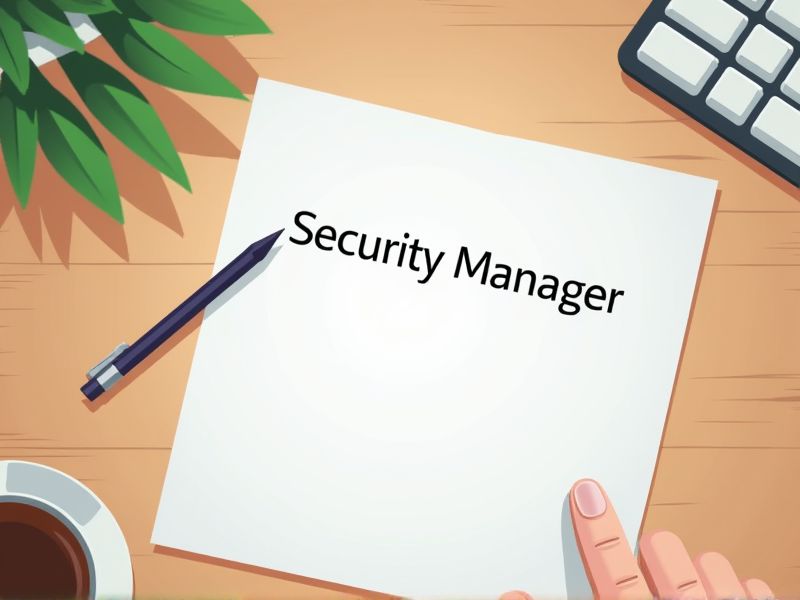
Security managers are tasked with the responsibility of protecting an organization's information systems and assets, making it crucial for them to possess specialized knowledge and skills. Certifications ensure that a security manager is equipped with standardized expertise to tackle diverse security challenges effectively. They not only validate a professional's proficiency in specific security domains but also enhance credibility and career advancement opportunities. Some essential certifications that may be required for a Security Manager include those such as CISSP, CISM, and CEH.
Certified Information Systems Security Professional (CISSP)
A Security Manager needs the CISSP certification because it validates their expertise in designing, implementing, and managing a cybersecurity program. It enhances their ability to understand various security concepts and technologies, necessary for protecting organizational data. The credential demonstrates a commitment to staying updated with the latest security trends and compliance regulations. Earning CISSP often leads to increased trust from stakeholders and potential career advancement opportunities.
Certified Information Security Manager (CISM)
Organizations face increasing cyber threats, driving the need for security managers with specialized skills like those demonstrated by a CISM. The CISM certification validates the ability to develop and manage enterprise information security programs effectively. Possessing this certification enhances a security manager's credibility, aligning with industry standards and best practices. Increased demand for skilled security managers with CISM leads to improved risk assessment and mitigation strategies within organizations.
Certified Chief Information Security Officer (CCISO)
A Security Manager benefits from a Certified Chief Information Security Officer (CCISO) by gaining strategic oversight on risk management, enhancing the organization's ability to preempt and mitigate threats effectively. CCISO provides the expertise in aligning security programs with business goals, ensuring that security efforts directly support organizational objectives. The certification equips the Security Manager with advanced knowledge in governance and management, critical for creating resilient information security frameworks. With CCISO credentials, a Security Manager can leverage industry best practices to maintain compliance and efficiently manage resources for improved operational efficiency.
Certified Information Systems Auditor (CISA)
The Certified Information Systems Auditor (CISA) credential is crucial for a Security Manager because it validates their expertise in assessing and managing IT systems, ensuring they meet industry compliance and regulations. With CISA, a security manager gains a comprehensive understanding of information systems auditing, control, and security, which is critical for protecting organizational data. The certification provides a framework that guides managers in identifying potential security risks and implementing effective mitigation strategies. Employers often seek CISA-certified professionals to lead their IT security teams, as this demonstrates a commitment to upholding rigorous standards in information systems security management.
Certified in Risk and Information Systems Control (CRISC)
CRISC certification equips Security Managers with the necessary skills to identify, assess, and prioritize risks, which enhances their ability to protect organizational assets. It provides a structured framework for implementing information systems controls, aligning IT with business objectives. This certification demonstrates a Security Manager's expertise in cybersecurity risk management, often boosting their credibility in stakeholder communications. As organizations face increasing cyber threats, CRISC-certified Security Managers are better positioned to develop and maintain robust security strategies.
CompTIA Security+
CompTIA Security+ provides a foundational understanding of essential security concepts, which equips a Security Manager with the knowledge necessary to oversee comprehensive security protocols. The certification emphasizes risk management and mitigation strategies, essential for identifying potential threats and minimizing their impact on organizational security. Due to its industry recognition, Security+ validates the Security Manager's capabilities to stakeholders, reinforcing trust in their ability to safeguard sensitive information. Additionally, the certification covers the latest trends and attack vectors, aligning a Security Manager's skills with current industry standards and ensuring they stay informed on evolving security challenges.
Certified Ethical Hacker (CEH)
Certified Ethical Hacker (CEH) provides a comprehensive understanding of cybersecurity threats, enhancing a security manager's ability to anticipate potential vulnerabilities. With CEH certification, security managers gain deeper insights into hacker mindset and methodologies, allowing for more effective risk mitigation strategies. The certification ensures that security managers are equipped with up-to-date tools and techniques crucial for safeguarding organizational assets. CEH equips security managers with the capability to conduct thorough penetration testing, ensuring robust defense mechanisms are in place.
GIAC Security Essentials (GSEC)
Security managers must possess up-to-date foundational knowledge, and the GIAC Security Essentials (GSEC) certification provides comprehensive coverage of core security concepts. By obtaining GSEC, managers enhance their understanding of both theoretical frameworks and practical security application, critical for strategic decision-making. The certification also helps validate their skills in identifying vulnerabilities, essential for managing and mitigating security risks. GSEC-certified managers are better equipped to lead their teams effectively in responding to security incidents and implementing preventive measures.
ISO/IEC 27001 Lead Implementer
Implementing ISO/IEC 27001 helps establish a robust information security management system, driving a structured approach to protecting sensitive data. A Security Manager with Lead Implementer training effectively analyzes security risks and applies appropriate controls, enhancing overall data integrity. This qualification underlines a manager's capability to align security strategies with business goals, improving organizational resilience against breaches. ISO/IEC 27001 Lead Implementer credentials also ensure comprehensive awareness of compliance requirements, minimizing potential legal and financial repercussions.
GIAC Security Leadership (GSLC)
Security managers require comprehensive knowledge of both technical and managerial aspects of cybersecurity; the GIAC Security Leadership (GSLC) certification provides this dual understanding. GSLC equips managers with the skills to design robust security policies, directly impacting an organization's resilience against threats. By obtaining the GSLC certification, managers enhance their aptitude for aligning security strategies with business objectives. The certification validates a manager's capability to effectively lead security teams, crucial for maintaining organizational integrity.
Summary
When you acquire certifications as a Security Manager, you enhance your credibility in the security industry. Certifications equip you with advanced skills, making you adept at identifying and mitigating security threats efficiently. This expertise often leads to improved trust from stakeholders and possible career advancement. Organizations tend to prioritize certified professionals, potentially resulting in increased job opportunities and salary benefits for you.
